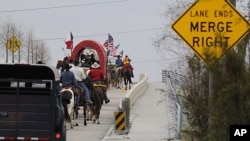Houston, Texas, is a city known for its modern architecture, complex road system and urban sprawl. But for three weeks every year it reconnects with its rural roots and cowboy past. The annual Houston Livestock Show and Rodeo starts this week as horses have invaded the city.
On parade day, horses displace cars on the streets of America's fourth-largest city.
“We have never seen so many cowboys and cows and horses all together with the trail wagons,” one spectator said.
The parade of horse flesh, cowboys and cowgirls has kicked off the annual Houston Livestock Show and Rodeo since 1938.
But since that time, Houston and other U.S. cities have grown larger, and very few children now grow up in rural areas with horses and cows.
Horses were the main attraction for many children in this crowd.
City kids may well get that chance. Most of the rodeo parade riders live in urban areas and get access to horses through associations and clubs in nearby rural areas.
Every year groups assemble at various locales in Texas, some hundreds of kilometers away, and ride into Houston, setting up overnight camp at Memorial Park.
For some, like Houstonian Santos Cruz, this is a chance to connect with history. “I wanted to have a feeling of how our ancestors had to cross this prairie at one time or another when there were no cars,” he said.
The annual trail rides are also a chance to socialize and for riders to get together with friends they may not see otherwise.
Gerald Barkley of Crockett, Texas, and his friend Donald Kimble of Terrell, Texas, meet up here every year with other friends they have made on the trail rides.
“We all get together and enjoy each other and some of us haven't seen each other in a year, so that brings out all the good to me,” Kimble said.
But they also say these rides maintain an important Texas tradition.
“They promote this way of life so it does not fade away from existence,” Barkley added.
At least this one time every year, many city and suburban folk get a chance to experience a bit of that cowhand life of old.




